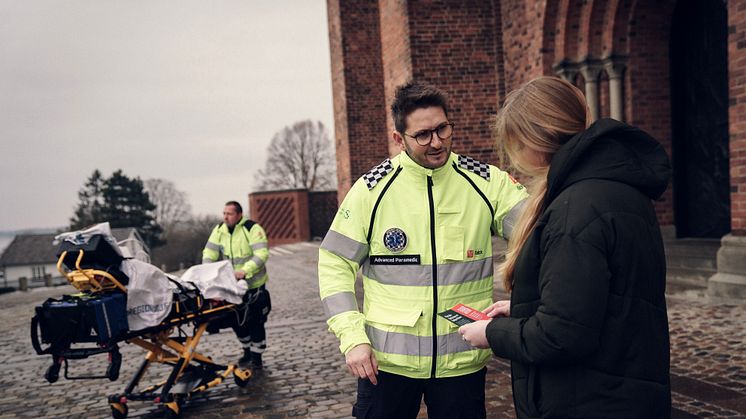
Press release -
Quick access to psychological first aid to bystanders
When serious accidents occur, it is not only the injured persons who are affected. Often, the experience also deeply affects family, friends, acquaintances or bystanders. Witnessing an accident can have serious mental consequences for bystanders and relatives, so it is important that they get the right help quickly to prevent prolonged illness. At Falck, psychologists, paramedics and innovators have therefore developed a new initiative that gives bystanders direct access to psychological help.
In Denmark, there are more than 200,000 cases of acute illness or injury each year that require an ambulance response. Relatives and bystanders play a crucial role during an accident: they call for help, provide first aid and take care of the patient until the ambulance arrives. During an accident, the help is naturally focused on the injured person, and there are limited resources for psychological first aid for bystanders and relatives. However, a study conducted by Falck shows that 24 percent of bystanders experience such serious mental challenges after the accident that they can, in the worst case, develop into a stress reaction and PTSD. Bystanders may be affected by vivid images of the accident, severe emotional swings, sleep problems and struggle with guilt and self-reproach.
The right early psychological intervention may prevent serious and prolonged illnesses, and therefore, Falck's psychologists and paramedics have developed a new initiative that gives bystanders and relatives access to help when they have witnessed an accident. The initiative is initially launched from Falck's ambulance unit in Roskilde, Region Zealand.
Three years ago, a bystander, who has been a part of developing the new initiative, gave CPR when her neighbor went into cardiac arrest. It took her four months to recover.
“The first month was hell. I would cry when I heard a siren. I still feel like it’s my fault he died.” says the first aider.
Falck's paramedics and ambulance staff are trained in mental first aid, and to the extent possible, they reassure bystanders and others involved at the scenes. But starting in September and for five weeks forward, they will also distribute a card with advice and guidance on how to best take care of oneself after witnessing an accident. The card also offers affected individuals a follow-up phone call with one of Falck's psychologists. Such a conversation will allow space for what is occupying the individual in relation to the experience, and they will also gain knowledge about reactions and possible actions.
"It can vary greatly how bystanders react in the period after an accident. Many think that they don't need help; they weren't the ones who got hurt. But from our studies and experiences, we know that in the days after a traumatic event, the experience is mentally processed. Early intervention is crucial to prevent long-term mental problems, but the transition phase and pitfalls are largely unaddressed in this context." says Jacob Vindbjerg Nissen, Chief Psychologist at Falck.
The initiative is initially launched in Region Zealand from Falck's ambulance base in Roskilde and will run for five weeks. After five weeks, Falck will evaluate the initiative and adjust it with a view to scaling it to other areas in Denmark.
Categories
About Falck
For more than a century, Falck has worked with local and national governments to prevent accidents, diseases and emergency situations, to rescue and assist people in emergencies quickly and competently and to rehabilitate people after illness or injury. This has made Falck an international leader in emergency response and healthcare services.
Falck operates in 26 countries and has approximately 25,000 employees.
.

